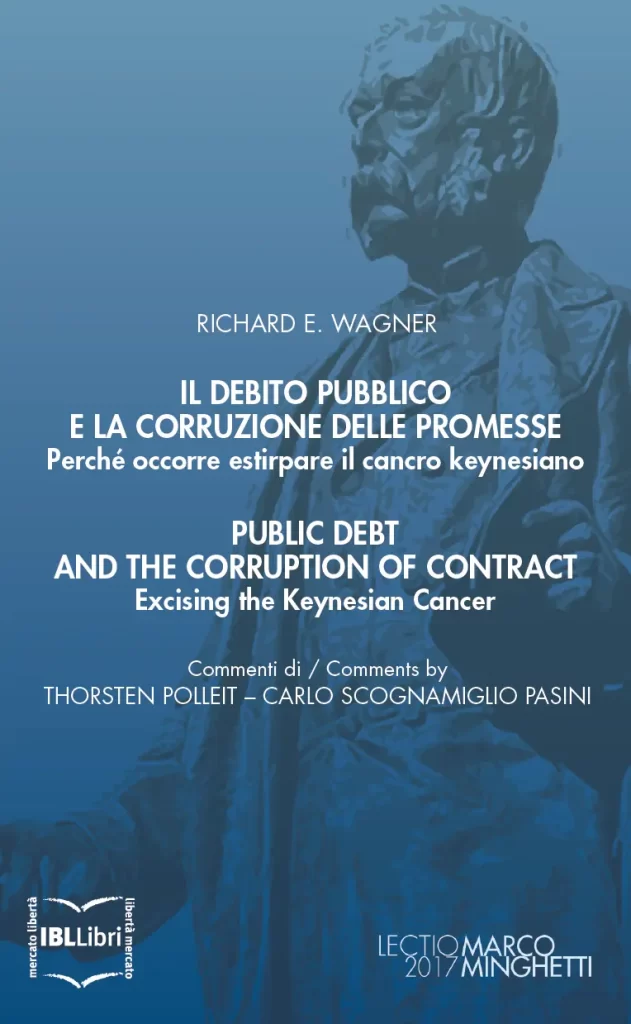Introduzione di Emmanuele F.M. Emanuele
Commenti di / Comments by Thorsten Polleit e Carlo Scognamiglio Pasini
“Le idee degli economisti e dei filosofi politici, tanto quelle giuste quanto quelle sbagliate, sono più potenti di quanto comunemente si creda. In realtà il mondo è governato da poco altro”. L’ultimo secolo ce lo conferma.
Secondo Richard E. Wagner (Hobart R. Harris Professor of Economics alla George Mason University) il pensiero di John Maynard Keynes ha contribuito pesantemente ad ampliare i limiti dei poteri pubblici nel XX secolo. Le sue teorie hanno insegnato agli economisti a pensare in termini di aggregati (come il rapporto debito-PIL ) piuttosto che di rapporti di scambio tra gli individui all’interno della società. Tale spostamento di attenzione ha corrotto il linguaggio dell’economia politica e il dibattito intorno alla pratica economica.
È questo il tema affrontato da Wagner in occasione della VI Lectio Marco Minghetti tenutasi a Roma nel marzo 2017.
Marco Minghetti (1818-1886) fu l’uomo politico che riuscì a conseguire nel 1875 il pareggio di bilancio nel nostro paese. Alla sua memoria è dedicata questa serie di eventi che vede importanti studiosi di rango internazionale confrontarsi con i temi legati alla sostenibilità delle finanze pubbliche. In precedenza le Lectiones Minghetti sono state tenute da Leszek Balcerowicz (già Governatore della Banca Centrale della Polonia), Vito Tanzi (già Direttore del Dipartimento di Finanza Pubblica del Fondo Monetario Internazionale), Ludger Schuknecht (Direttore Politica fiscale generale e Politica finanziaria e monetaria internazionale presso il Ministero delle Finanze tedesco), Carlo Cottarelli (Direttore esecutivo del Fondo Monetario Internazionale) e William White (Presidente dell’Economic and Development Review Committee dell’OCSE).
Testo inglese a fronte
- Emmanuele F.M. Emanuele è Presidente della Fondazione Roma
- Thorsten Polleit è Professore onorario di Economia alla Università di Bayreuth
- Carlo Scognamiglio Pasini è Professore emerito di Economia applicata alla LUISS Guido Carli
- Richard E. Wagner è Professore di Economia alla George Mason University
Introduction by Emmanuele F.M. Emanuele
Comments by Thorsten Polleit e Carlo Scognamiglio Pasini
“The ideas of economists and political philosophers, both when they are right and when they are wrong, are more powerful than is commonly understood. Indeed the world is ruled by little else.” The history of the past century is evidence of the truth of this sentence.
According to Richard E. Wagner (Hobart R. Harris Professor of Economics at George Mason University) the ideas of John Maynard Keynes significantly contributed to the broadening of the scope of government in the 20th century. His theories brought economists to conceive the economy in terms of aggregates (such as the debt-to-GDP rate), instead of exchanges between individuals in society. This shift of focus corrupted the very language of political economy and the discourse on the practice of economics.
Professor Wagner investigated this issue in the occasion of the 6th Lectio Marco Minghetti held in Rome on March 2017.
Marco Minghetti (1818-1886) is the one Italian official who achieved a balanced budget, under his stewardship of the Ministry of Finances in 1875. The Lectio Minghetti is a series of lectures dedicated to the memory of this remarkable Italian statesman, given by internationally renowned scholars on issues related to the sustainability of the public finances of Western countries.
Previous lectures were held by Leszek Balcerowicz (former President of the Polish central Bank), Vito Tanzi (former Director of the IMF’s Fiscal Affairs Department), Ludger Schuknecht (Director of General Fiscal Policy and International Financial and Monetary Policy at the German Ministry of Finance), Carlo Cottarelli (Executive Director of the International Monetary Fund) and William White (President of the OECD’s Economic and Development Review Committee).

